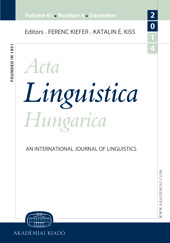Allomorphic responses in Serbian pseudo-nouns as a result of analogical learning
Allomorphic responses in Serbian pseudo-nouns as a result of analogical learning
Author(s): Petar Milin, Emmanuel Keuleers, Dušica Filipović-ĐurđevićSubject(s): Psycholinguistics, Cognitive linguistics, South Slavic Languages
Published by: Akadémiai Kiadó
Keywords: allomorphy; memory-based learning; analogy; wug test; Serbian;
Summary/Abstract: Allomorphy is a phenomenon that occurs in many languages. Several psycholinguistic studies have shown that allomorphy, if present, co-determines cognitive processing. In the present paper we discuss allomorphic variations of Serbian instrumental singular form of pseudo-nouns as emerging from analogical learning. We compare the predictions derived from memory-based language processing models with results from a previous experimental study with adult Serbian native speakers. Results confirm that the production of suffix allomorphs in Serbian instrumental singular masculine nouns can be accounted for by memory-based learning and simple analogical inferences. The present findings are in line with a growing body of research showing that memory-based learning models make relevant predictions about the cognitive processes involved in various linguistic phenomena.
Journal: Acta Linguistica Hungarica (Since 2017 Acta Linguistica Academica)
- Issue Year: 58/2011
- Issue No: 1
- Page Range: 65-84
- Page Count: 20
- Language: English

